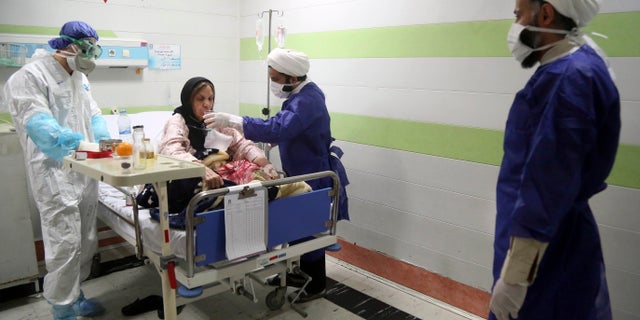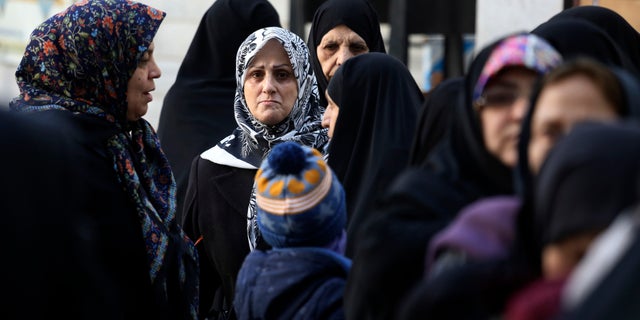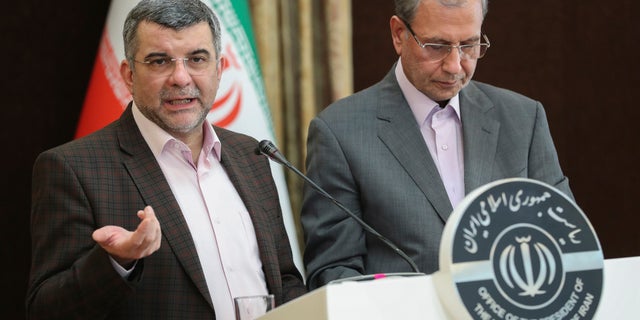Ali Mohammadi Bloomberg News
BEIRUT — The Middle East is shutting down as the novel coronavirus accelerates its spread across a part of the world where war, famine, financial collapse and political unrest threaten to compound the impact of the disease.
The vast majority of the 16,659 infections reported in the region as of Monday are in Iran, one of the world’s worst-hit countries and the origin of most of the 1,692 cases counted in other Middle Eastern and North African countries.
As the numbers climb around the region, governments are starting to act, upending life in a part of the world that has historically served as a crossroads of religion, trade and travel.
Prayers are being canceled, bars and cafes closed, flights grounded, and festivals and pilgrimages called off. The al-Aqsa Mosque in Jerusalem, the Church of the Nativity in Bethlehem, and the Shiite Muslim shrine in Karbala, Iraq, are among the great religious sites that have been closed. Barbar, a beloved Lebanese eatery renowned for having stayed open throughout the country’s long civil war, has shut for the first time in memory.
Iraq is bracing for the imposition of a curfew starting Tuesday after the government declared a state of emergency. Lebanon began a two-week lockdown on Monday, and Saudi Arabia ordered government offices, businesses and malls to close.
Trade and travel are skidding to a halt. Saudi Arabia has suspended all travel in and out of the kingdom. The United Arab Emirates has suspended flights to many locations and stopped issuing visas, but said on Tuesday it would continue to allow visa-free entry to many countries, including the United States. Jordan, Lebanon and Iraq are sealing their borders and will close their airports within days.
The interruption of economic activity is going to exact a heavy toll on the region’s already struggling citizens at a time of severe economic strain, political instability and conflict, analysts say.
“There’s a series of cascading crises which ultimately feed into one another, an interconnected web of catastrophes,” said Jon Alterman of the Center for Strategic and International Studies. “These countries are not facing one; they are facing two or three crises simultaneously.”
Ammar Awad
Reuters
Worshipers pray in front of the Dome of the Rock in Jerusalem’s Old City after al-Aqsa Mosque was closed because of the coronavirus.
A decade of upheaval since the Arab Spring revolts has ravaged economies that were in trouble before the coronavirus crashed global markets.
The oil price war launched by Saudi Arabia — partly as a consequence of the coronavirus and the collapse in worldwide demand — has cratered prices, threatening economies across the region.
Oil producers in the Persian Gulf countries will be forced to cut back spending, and countries elsewhere that depend on remittances from expatriates in the gulf region will also suffer, said Nasser Saidi, a Dubai-based economist and former Lebanese finance minister.
Lebanon is in the throes of a financial crisis that has seen its currency collapse amid widespread street protests. Iraq, which depends on oil for almost all its income, will be badly hit at a time when political protests there have rocked the country.
The region will almost certainly slide into recession, Saidi said.
“It means unemployment will get worse. It means socioeconomic conditions will deteriorate. There will be more distress, more social problems and more political protests,” he said. “It’s not a pretty picture for the Middle East.”
Meanwhile, wars are raging in Syria, Yemen and Libya, which have not reported any cases but are home to millions of people who are impoverished, hungry and uniquely vulnerable to the spread of disease. Millions more are crowded into refugee camps and settlements in surrounding countries, where diseases spread rapidly, said Fabrizio Carboni, Middle East director for the International Committee of the Red Cross.
“Even, quote, advanced countries are struggling,” he said. “One can only imagine what the situation will be like in countries affected by conflict.”
Many of the region’s authoritarian governments are notoriously opaque, and there are widespread suspicions that some countries aren’t acknowledging the scale of their problems. Though Syria insists it has detected no coronavirus cases, health experts say it is unlikely to have escaped a virus that has embedded itself among its neighbors.
With the exception of some wealthy Arab gulf countries, health-care systems lag far behind those of the Western and Asian countries that are barely able to cope — and they are likely to be even more overwhelmed, said Emile Hokayem of the International Institute for Strategic Studies. Meanwhile, the wealthier countries on which they typically rely for aid during moments of crisis will be consumed with their own coronavirus challenges.
“This is going to supercharge and exacerbate all the existing problems at a time when every other country in the world will be focusing on the crisis at home and their own needs,” he said.
It may already be too late to halt the spread of the novel coronavirus in a region where the biggest countries were slow to wake up to the severity of the risk and to warn citizens of the dangers.
The realization that the Iranian government has been less than transparent about the toll exacted by the virus’s spread has spooked countries with large Shiite populations that travel and interact extensively with Iran, for reasons of politics, religion and trade.
Lebanon and Bahrain, with large Shiite populations, are reporting some of the highest growth rates in infections. The numbers are relatively small, but so are their populations, and on a per capita basis, they have rates as high as the fast-growing ones in European countries such as Britain and Germany.
Patrick Baz
AFP/Getty Images
Police in Beirut ask a jogger to leave the area on Monday, a day after the government urged people to stay at home for two weeks.
Iran’s closest neighbor, Iraq, has reported relatively few cases compared to its size — 110 infections and nine deaths — but there are fears the toll could be higher. After the extent of the problem in Iran began to emerge last month, Iraq swiftly barred entry to Iranians. But until last week, Iraqis continued to travel back and forth across the country’s long border with Iran.
Adham Ismail, the World Health Organization’s Iraq representative, said the number of infections could be higher by a few hundred, probably mild cases. There is, however, no reason to believe that a major spread is imminent, he said. Keeping the numbers as low as they are so far has been “a medical miracle,” he said.
But if there were to be a rapid escalation, the disease would quickly overwhelm Iraq’s limited health resources. The country has used up 80 percent of the approximately 6,000 testing kits delivered so far and is waiting for more, Ismail said. Years of war and rampant corruption have hollowed out its once superior health system, and there aren’t enough respirators or ventilation equipment to deal with a much larger outbreak, he said.
Even countries with relatively sophisticated health systems, such as Lebanon, will be swamped if the numbers climb higher, said Souha Kanj, who heads the infectious diseases department at the American University of Beirut. She added she believes they will.
Lebanon has imported cases from Egypt, Iran, China, France and the United Kingdom, but the most recent infections suggest community transmission is taking hold, making it harder to contain the spread of the disease, she said. Kanj said she suspects the real number of cases could be hundreds higher than the official number because of people failing to report their symptoms.
Only Egypt has yet to take any significant steps to combat the spread of the coronavirus, despite mounting evidence that it could be the origin of dozens of infections worldwide, including in the United States and parts of the Middle East. The U.S. Centers for Disease Control and Prevention said Sunday that 60 infections had been found in 15 states linked to Nile cruises.
Yasser Al-Zayyat
AFP/Getty Images
Expatriates returning from Egypt, Syria and Lebanon wait be tested for the virus in Kuwait City on Monday.
This story has been updated to clarify UAE policy.
Read more:
Today’s coverage from Post correspondents around the world
Like Washington Post World on Facebook and stay updated on foreign news
https://news.google.com/__i/rss/rd/articles/CBMiugFodHRwczovL3d3dy53YXNoaW5ndG9ucG9zdC5jb20vd29ybGQvbWlkZGxlX2Vhc3QvdGhlLW1pZGRsZS1lYXN0LWlzLWFscmVhZHktd3JhY2tlZC1ieS13YXItbm93LWl0LW11c3QtY29uZnJvbnQtY29yb25hdmlydXMtdG9vLzIwMjAvMDMvMTYvYTIzM2QyYjAtNjJmOC0xMWVhLThhOGUtNWM1MzM2YjMyNzYwX3N0b3J5Lmh0bWzSAQA?oc=5
2020-03-17 12:58:02Z
52780662414427






